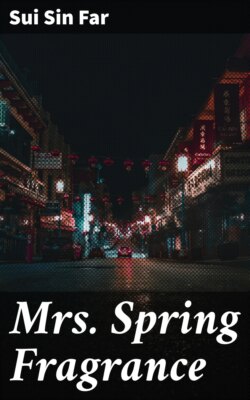Читать книгу Mrs. Spring Fragrance - Sui Sin Far - Страница 16
На сайте Литреса книга снята с продажи.
I
ОглавлениеOld Li Wang, the peddler, who had lived in the land beyond the sea, was wont to declare: “For every cent that a man makes here, he can make one hundred there.”
“Then, why,” would ask Sankwei, “do you now have to move from door to door to fill your bowl with rice?”
And the old man would sigh and answer:
“Because where one learns how to make gold, one also learns how to lose it.”
“How to lose it!” echoed Wou Sankwei. “Tell me all about it.”
So the old man would tell stories about the winning and the losing, and the stories of the losing were even more fascinating than the stories of the winning.
“Yes, that was life,” he would conclude. “Life, life.”
At such times the boy would gaze across the water with wistful eyes. The land beyond the sea was calling to him.
The place was a sleepy little south coast town where the years slipped by monotonously. The boy was the only son of the man who had been the town magistrate.
Had his father lived, Wou Sankwei would have been sent to complete his schooling in another province. As it was he did nothing but sleep, dream, and occasionally get into mischief. What else was there to do? His mother and sister waited upon him hand and foot. Was he not the son of the house? The family income was small, scarcely sufficient for their needs; but there was no way by which he could add to it, unless, indeed, he disgraced the name of Wou by becoming a common fisherman. The great green waves lifted white arms of foam to him, and the fishes gleaming and lurking in the waters seemed to beseech him to draw them from the deep; but his mother shook her head.
“Should you become a fisherman,” said she, “your family would lose face. Remember that your father was a magistrate.”
When he was about nineteen there returned to the town one who had been absent for many years. Ching Kee, like old Li Wang, had also lived in the land beyond the sea; but unlike old Li Wang he had accumulated a small fortune.
“’Tis a hard life over there,” said he, “but ’tis worth while. At least one can be a man, and can work at what work comes his way without losing face.” Then he laughed at Wou Sankwei’s flabby muscles, at his soft, dark eyes, and plump, white hands.
“If you lived in America,” said he, “you would learn to be ashamed of such beauty.”
Whereupon Wou Sankwei made up his mind that he would go to America, the land beyond the sea. Better any life than that of a woman man.
He talked long and earnestly with his mother. “Give me your blessing,” said he. “I will work and save money. What I send home will bring you many a comfort, and when I come back to China, it may be that I shall be able to complete my studies and obtain a degree. If not, my knowledge of the foreign language which I shall acquire, will enable me to take a position which will not disgrace the name of Wou.”
His mother listened and thought. She was ambitious for her son whom she loved beyond all things on earth. Moreover, had not Sik Ping, a Canton merchant, who had visited the little town two moons ago, declared to Hum Wah, who traded in palm leaves, that the signs of the times were that the son of a cobbler, returned from America with the foreign language, could easier command a position of consequence than the son of a school-teacher unacquainted with any tongue but that of his motherland?
“Very well,” she acquiesced; “but before you go I must find you a wife. Only your son, my son, can comfort me for your loss.”
